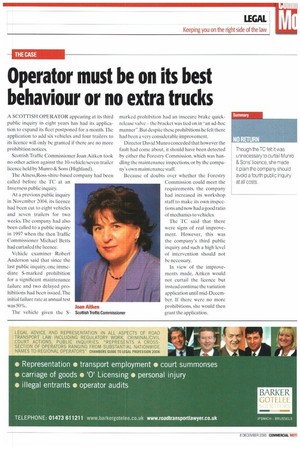Operator must be on its best behaviour or no extra trucks
Page 37

If you've noticed an error in this article please click here to report it so we can fix it.
A SCOTTISH OPERATOR appearing at its third public inquiry in eight years has had its application to expand its fleet postponed for a month. The application to add six vehicles and four trailers to its licence will only be granted if there are no more prohibition notices.
Scottish Traffic Commissioner Joan Aitken took no other action against the I 0-vehiclelseven-trailer licence held by Munro & Sons (Highland).
The Alness,Ross-shire-based company had been called before the TC at an Inverness public inquiry.
At a previous public inquiry in November 2004, its licence had been cut to eight vehicles and seven trailers for two weeks. The company had also been called to a public inquiry in 1997 when the then Traffic Commissioner Michael Betts had curtailed the licence.
Vehicle examiner Robert Anderson said that since the last public inquiry, one immediate S-marked prohibition for a significant maintenance failure and two delayed prohibitions had been issued. The initial failure rate at annual test was 50%.
The vehicle given the S marked prohibition had an insecure brake quickrelease valve — the bracket was tied on in an ad-hoc manner". But despite these prohibitions he felt there had been a very considerable improvement.
Director David Munro conceded that however the fault had come about, it should have been detected by either the Forestry Commission, which was handling the maintenance inspections, or by the company's own maintenance staff.
Because of doubts over whether the Forestry Commission could meet the requirements, the company had increased its workshop staff to make its own inspections and now had a good ratio of mechanics to vehicles.
The TC said that there were signs of real improvement. However, this was the company's third public inquiry and such a high level of intervention should not be necessary.
In view of the improvements made, Aitken would not curtail the licence but instead continue the variation application until mid-December. If there were no more prohibitions, she would then grant the application.




































































































































































































